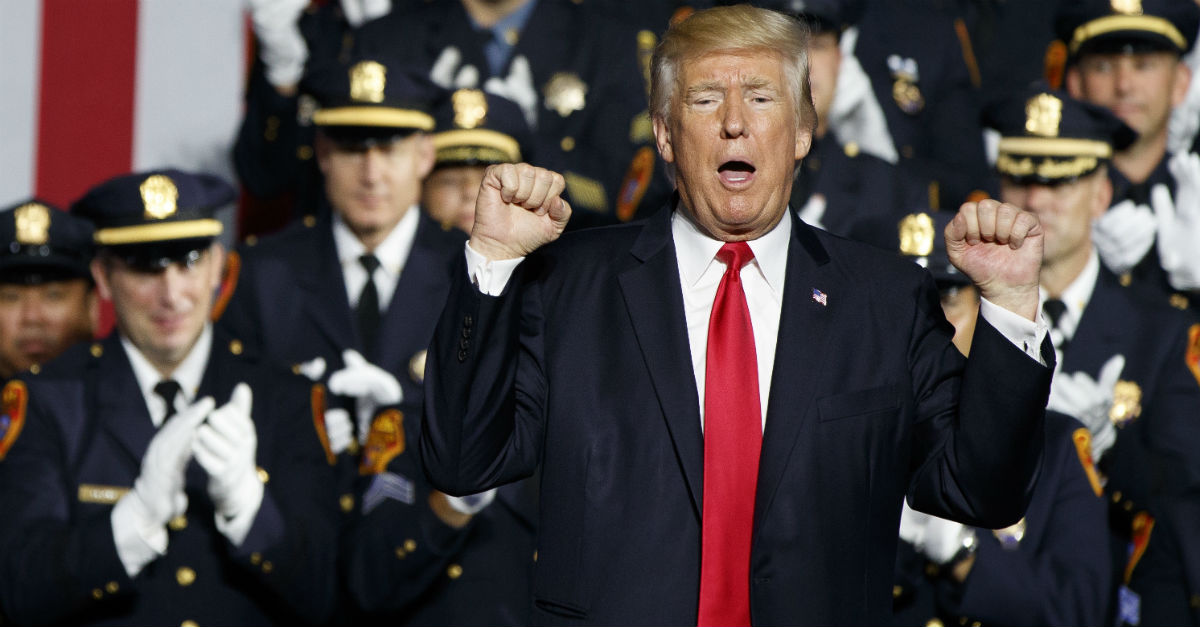President Trump spoke to a group of police officers in New York Friday, and this was part of his remarks:
Videos by Rare
When you see these towns and when you see these thugs being thrown into the back of a paddy wagon — you just see them thrown in, rough — I said, ‘Please don’t be too nice.’ Like when you guys put somebody in the car, and you’re protecting their head, you know, the way you put their hand over? Like, don’t hit their head, and they’ve just killed somebody — don’t hit their head. I said, ‘You can take the hand away, okay?’
The assembled audience of law enforcement responded to this endorsement of casual police violence with laughter and applause. You can hear it in this video of the moment:
Trump just told police officers that they can be more violent than they already are. And they cheered. pic.twitter.com/KjYI3pxcVG
— deray (@deray) July 28, 2017
RELATED: Fake street signs are warning Minnesota residents of “easily startled” police
As footage of Trump’s comments spread and uproar ensued, many police departments and organizations rushed to express their disagreement with Trump’s words.
“Law enforcement officers are trained to treat all individuals, whether they are a complainant, suspect, or defendant, with dignity and respect,” said a statement from the International Association of Chiefs of Police. “This is the bedrock principle behind the concepts of procedural justice and police legitimacy.”
Representatives of the police departments of Los Angeles, New Orleans and New York’s Suffolk County, which had officers in the crowd at Trump’s talk, all said what he advocated would violate their departmental policies. Police from Gainesville, Fla., specifically described and denounced Trump’s remarks as an endorsement of “brutality,” while the New York Police Department made a statement rejecting use of force beyond “measures that are reasonable and necessary under any circumstances.”
Now, the charitable interpretation of Trump’s remarks is that he meant them as a joke and would never actually advise police to rough up suspects — people our Constitution says are innocent until proven guilty — or to engage in violence more broadly.
Personally, I’m not inclined to be quite that charitable. Obviously Trump did want to get a laugh, but I see no evidence he wasn’t also sincerely supporting at least police misconduct, if not outright brutality.
It should go without saying this is “disgraceful and anathema to responsible policing,” as the Cato Institute’s Jonathan Blanks writes. It’s also advocacy of a federal crime and evinces gross disregard for the rule of law, none of which is really surprising coming from Trump, who has long displayed an affinity for authoritarianism and a callous disregard for individual rights, especially where criminal justice is concerned.
More interesting, then, is the police response.
On the one hand, it’s good to see so many departments rejecting Trump’s remarks. On the other hand, most of the responses I’ve seen were procedural, focusing on officer compliance with departmental use of force policies.
The trouble is these policies vary widely. Many give officers far too much leeway, and when combined with current Supreme Court precedent on what counts as ‘reasonable’ use of force, they make it almost impossible to convict cops for truly appalling behavior — like the killings of Philando Castile, Freddy Gray or Eric Garner.
“Excess is in the eyes of the beholder,” explained William Terrill, a former police officer who now teaches criminal justice at Michigan State. “To one officer, ‘objectively reasonable’ means that if you don’t give me your license, I get to use soft hands, and in another town, the same resistance means I can pull you through the car window, [or] I can Tase you.”
For example, a 2016 assessment of use of force policies in 17 major cities found rampant failure to make life preservation the priority, to require de-escalation, to use non-lethal methods wherever possible or even to require officers to intervene when they see colleagues using excessive force. In four of the cities (Chicago, Houston, Los Angeles and San Antonio), cops don’t have to give any verbal warning — even if there’s time to do so — before shooting someone.
In other words, compliance with use of force policies can mean a lot of different things, and as most of these policies stand now, they are not an adequate antidote to Trump’s advice.
The other troubling aspect of the police response to Trump is the broad refusal to admit he was encouraging a problem that already exists. Here’s a tweet that shows what I mean:
https://twitter.com/ChiefMccall/status/891069917419548672
RELATED: It’s a good idea to be polite to cops, but politeness won’t solve police misconduct
Note the use of the word “continue.” While certainly many people in law enforcement do act professionally, this blaring silence about the very real and systemic problem of police brutality in America severely undercuts these critiques of Trump.
In Christianity, we talk a lot about repentance. It doesn’t simply mean saying a sin is wrong; it means turning away from that sin and walking in a new direction. Moralizing without repentance will always ring hollow, and so will police denunciation of Trump’s shameful remarks when it comes without a meaningful rejection of entrenched police misconduct in America.



